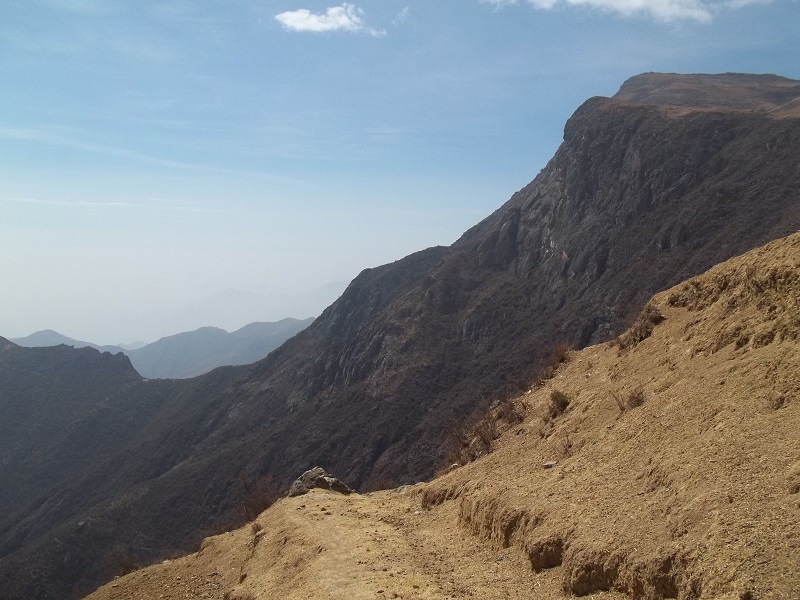
A lot can be learned from Scott Hubbartt's misadventure in the high Peruvian puna.
Sometimes, when we are pushing ourselves to new extremes, we forget we’re not invincible. This lesson is one that retired military veteran, Scott Hubbartt learned the hard way.
Having joined the army at the young age of 17, Hubbartt had spent 30-plus years rising in the ranks, proudly serving all around the world. As is required for all military personnel, Hubbartt has gone through rigorous survival training to ensure he will be adequately prepared in case of emergency situations.
“I knew all the basics,” he said. “I could make camp, build a fire, dig for water, find food. I felt pretty confident in my skills.”
When he retired, Hubbartt found solace in the outdoors, staying active by participating in a number of climbs with friends. He also became interested in genealogy, specifically his wife’s ancestors who had originally come from China, but had immigrated to Peru. In hopes of learning all he could, Hubbartt began to travel frequently.
“It was my form of a mid-life crisis,” Hubbartt said with a laugh. “Some men chase women, I chased travel.”
It was on one of his trips to his wife’s home country that, what he originally thought would be a several-hour-long hike, turned into a struggle for survival.
In hopes of tracing the steps of his wife’s grandfather, Hubbartt decided to hike the high plateaus before the Andes known as the “Puna.” He was dropped off at the top of the trail with two compasses, a map, a small survival pack, two-and-a-half liters of water, and a smile on his face. No guide accompanied him, even though his wife and sister-in-law both urged him to hire one.
“I was cocky,” he recalled. “I had done harder treks in the past and I thought, with all my training, this hike would be no big deal. It would make a great story.”
So he set off, with a confidence he said rivaled that of Indiana Jones. After making surprisingly little progress, Hubbartt decided he should set up camp for the night, lying under the stars with just a thin thermal blanket to keep him warm. The next morning, he woke and realized he was out of water. After making little progress in the morning and noticing his two compasses were pointing in opposite directions, his confidence quickly turned to worry.
Hubbartt’s extreme thirst was the main determent to his journey. This desperate need for water caused him to not only attempt to squeeze some out of clay, which made him violently ill, but he also attempted to squeeze water from ants. The latter resulted in a allergic reaction in which his tongue swelled and briefly blocked his ability to breathe.
The nearest village was at the bottom of the mountain and Hubbartt was unknowing walking away from it.
After five days of wandering, he had resigned himself to death. In one last feeble attempt, Hubbartt summoned every last ounce of strength to follow a man-made road he had seen the day before in hopes of stumbling upon some form of life.
“I knew I was going to die,” he said. “At one point, I fell and a spine went through my hand and I didn’t even bleed because I was so dehydrated. I knew I was done. I just wanted my family to know that I died trying to get back to them.”
Then, in a scene that began as a hallucination, Hubbartt’s luck changed. Those hallucinations turned into people. Workers in hard hats traveling to the nearby concrete mine finally came into focus, and Hubbartt found himself being carried to their camp where they would give him water and fruit and seek to bring the dying man back to life.
Over the course of the trip, Hubbartt had turned into a shadow of himself. He was now 35 pounds lighter and had discovered a new appreciation for water and, ultimately, existence.
“It was a miracle that I survived,” he said. “I knew when I got back that I needed to share the story.”
His new book, A Short Walk on the Edge of Life, is set to be released by Random House this month. It chronicles Hubbartt’s journey, while promoting the overall theme of safety and awareness for all outdoors enthusiasts.
“I didn’t understand how fragile we were before this happened, “ Hubbartt said. “I always thought in me-against-nature [situations], I would win. I was prepared. But we are so small and nature is so big, I think sometimes we forget. Nature will always win.”
But this doesn’t mean he has stopped enjoying it. Hubbartt has participated in a number of journeys, including a trek with a good friend in the mountains of Maryland. But his approach to these adventures has been forever altered. This time, when the elements challenged them, Hubbartt had enough sense to know when to turn around and go home.
“That was a new wisdom,” he said. “Having enough sense to say enough is enough and not push it because, ultimately, we aren’t in charge.”
In some final advice to all hikers, Hubbartt said simply, “Plan for the worst but hope for the best. I will always love the outdoors, but I can’t stress how important it is to be prepared and not underestimate it. Expect the unexpected.”
Images courtesy of Scott Hubbartt

 Your Privacy Choices
Your Privacy Choices

 The
The